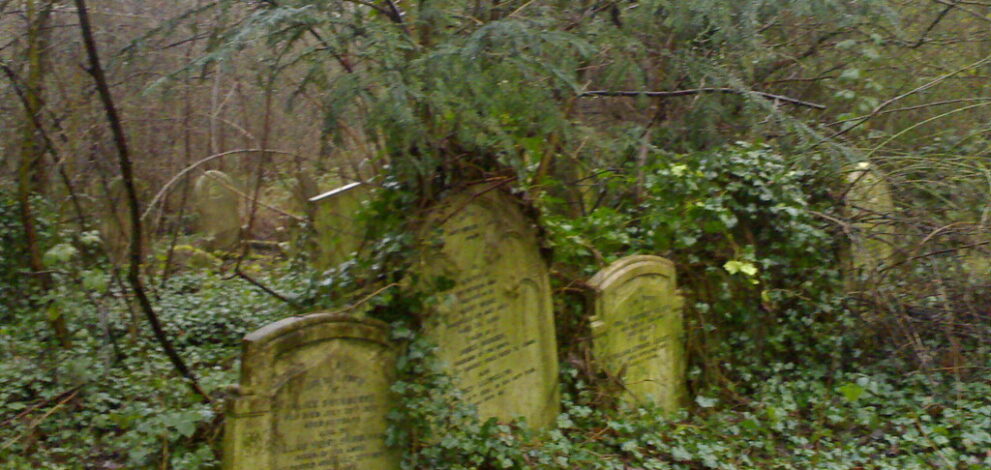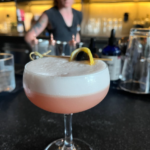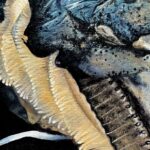Beck Babcock
The graves were hidden by overgrown swallow-wort and Japanese honeysuckle, the
moss-topped stones strangled, suffocated by the inevitable passage of time. The plants that
covered them grew and died, and came back again and flourished. He watched it all: saw how
they grew and the offspring that sprouted from them, the way they slowly took over everything
in their path until they covered the ground with hundreds of little green leaves and yellow
flowers that looked like bells. The plots were once well taken care of: the grass trimmed, the
stones polished, and the invasive species kept at bay, but now the words that were etched into the
markers were lost to time, only remembered by the ancient birth records that were tucked away
in the local archives. He didn’t need to see the stones to know the words engraved upon them. He
was there, watching from the shadows of the forest, when they were set into the ground.
The skeleton that lay beneath his feet was once called Cecilia. He wished he was lying
there with her, tangled in her arms. That’s how they had planned to be buried; together, even if
they had to dig the grave again and peel back the shroud. Alongside her was buried Mary Ann,
their daughter. He could picture their bones dressed in plain wool dresses and wrapped in rough
linen. Or maybe, he hoped, he had left them enough money to afford coffins. He was grateful
that Mary Ann had married. Her husband laid there, too, with their young daughter, Frances. He
repeated their names in his head over and over like a prayer. Cecilia, Mary Ann, James, Judah,
Frances, William….His name was there, too. It was etched into the stone when he never
returned, and they presumed him dead. He wondered if Cecilia was laid with her arms open,
waiting for him.
Many nights he walked where the colony once stood and pictured them going about their
lives. He pictured them growing, living and dying: working the fields, and feeding the chickens.
He saw his son’s crooked-tooth smile when he brought home a big hunt and his daughter and
wife washing clothes together at the pond. That was his favorite place to go. They called it Big
Island Pond now, although it didn’t have a name when he lived there countless years ago. He
liked that name. After all, there was indeed an island in the pond, although it wasn’t very big. On
the shore, he often found scraps of food, lost toys, and tools: little pieces of human life among
the wilderness in which they survived, and in the summer, he liked to sit there and listen to the
constant, hypnotizing drone of the bullfrogs. Now he could stay there all night if he wished
because the mosquitoes didn’t bother him. He had no blood to feed on. They danced and buzzed
around him, sometimes a hair’s width away, but never quite touching. They were his only
companions now. Strange and inescapable. They had been with him the night that Cecilia
screamed.
Her shriek echoed in his head. He still remembered the cadence of it and the way she kept
wailing, her lungs never seeming to run out of air. It was the wild screech of a grieving mother.
The humid and heavy air around him had shaken with the sound of it. He had sprinted towards
the farm, and when he reached the fence, he looked towards the house. Cecilia was being pulled
from the doorway. Her body was enveloped in the reverend’s embrace, and she pounded on his
chest like a woman possessed, pleading with him, asking God to bring her son back. The
physician came from inside the home, shaking his head. He carried a bundle of sheets soaked in
blood. Her boy, his son, had died in the same place he was born, at only fifteen years old.
Five years later on Christmas Eve, he watched from the doorway of an old tool shed, unnoticed, partially eclipsed by the thick snowflakes fluttering through the air. Mary Ann had arrived, to the same home where his son had died. She was carrying a tiny baby girl and was excited to show her mother. She was so small, with chubby red cheeks. He wanted to hold her, to feel the skin of his grandchild against his own. He wanted to hold her to his chest so she could feel the heartbeat he no longer had, but he was forbidden: forgotten about and assumed dead, and now that baby lay beneath his feet, too.
The cycle of life continued, but he remained the same. The same wrinkles he couldn’t see, but could feel as he touched his face, the same unfading scar on his knee, the same brown locks of hair, but the world continued without him. Cecilia grew old and withered, Mary Ann had more children and grandchildren of her own, and soon her name was lost to the new generations that came after her. It had been 300 years now, and he would never forget their names or their voices, even if the world had left them behind.






